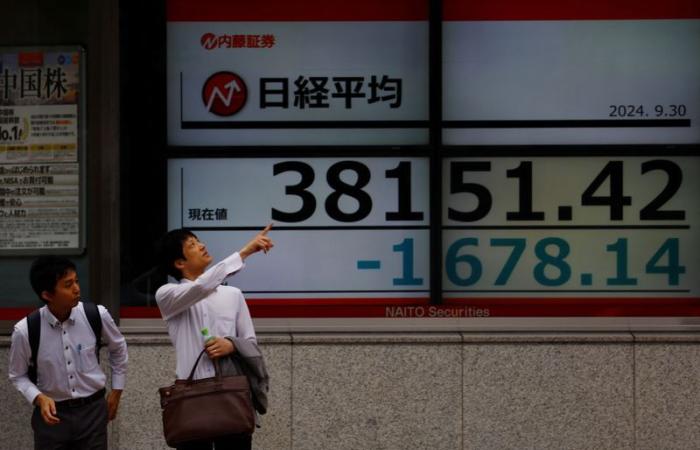Asian stocks fell on Wednesday, catching up with Wall Street’s decline after Iran’s ballistic missile launch on Israel sparked fears of a broader regional conflict, while crude oil rose on the risk of supply disruptions.
Investors turned to safer assets, pushing down U.S. Treasury bond yields on Asian time, while gold hovered near its all-time high.
The dollar, a safe haven, came close to its highest level in three weeks against the euro. Macroeconomics also supported the dollar, with the resilience of the US jobs market arguing for a Federal Reserve interest rate cut in November, and inflationary trends in the Eurozone supporting Bank easing. European center this month.
Japan’s Nikkei fell 1.5% by 0022 GMT, while South Korea’s KOSPI fell 1.3% and Australia’s benchmark lost 0.3%.
MSCI’s broadest index of Asia-Pacific shares slipped about 0.5%.
Hong Kong’s Hang Seng has yet to open after a public holiday on Tuesday. Mainland China markets are closed for the Golden Week holiday. In Taiwan, transactions were suspended due to a typhoon.
Futures on the US S&P 500 stock index fell 0.16%, after the index lost 0.9% overnight.
“In the chain of potential market volatility shocks, geopolitics will generally trump the economy, corporate profits, or central bank response, largely because most market participants do not know how to price the risks associated with these events,” said Chris Weston, head of research at Pepperstone.
“While these events generally resolve in a positive way for the market, the residual risk they may create is clearly significant,” Mr Weston said. “The situation remains fluid, and the slightest calming or greater aggressiveness in the rhetoric of Israel or Iran could have a considerable impact on market sentiment.”
Iran declared early Wednesday that its missile attack on Israel was over, barring further provocation, although Israel and the United States had promised retaliation.
Brent crude oil futures gained more than 1% to $74.33 a barrel, extending Tuesday’s 2.5% advance. U.S. WTI futures gained 1.3% to $70.73 a barrel, following Tuesday’s 2.4% rise.
Gold fell 0.16% to $2,658.63 an ounce, following a jump of more than 1% in the previous session that brought it closer to last month’s record high of $2,685.42.
Yields on 10-year Treasury bonds fell 1.5 basis points to 3.7278%.
The dollar index, which compares the US currency to the euro and five other currencies, remained stable at 101.21 after reaching 101.39 on Tuesday, for the first time since September 19.
Europe’s common currency was little changed at $1.1070 after a 0.6% decline in the previous session, where it hit $1.1046 for the first time since September 12.
Euro zone data showed on Tuesday that inflation fell below the ECB’s 2% target last month, strengthening bets for a quarter-point rate cut on October 17.
Meanwhile, overnight U.S. figures showed a strong economy, a day after Fed Chairman Jerome Powell pushed back on the likelihood of another 50 basis point rate cut at the Fed meeting. the US central bank next month.
Job openings rose unexpectedly in August after two consecutive monthly declines, but hiring was weak and consistent with a slowdown in the labor market.
Private payrolls data are due later on Wednesday, ahead of potentially crucial monthly nonfarm payrolls figures on Friday.
US politics will also be in focus, as Democrat Tim Walz and Republican JD Vance face off in a vice presidential debate on Wednesday.






